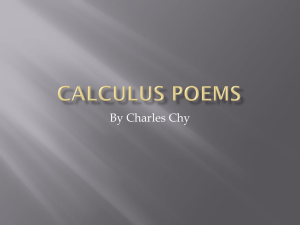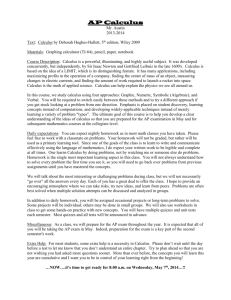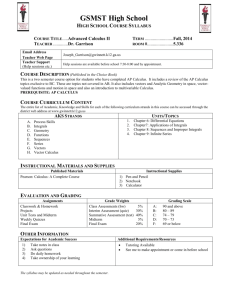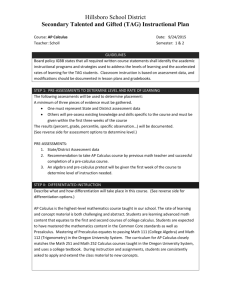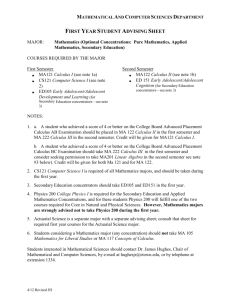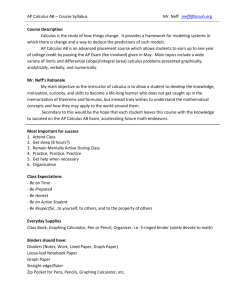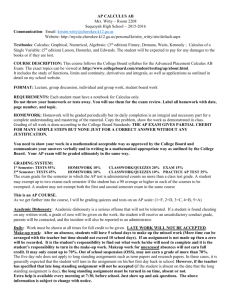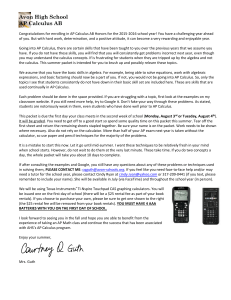Mathematics at GSSM
advertisement
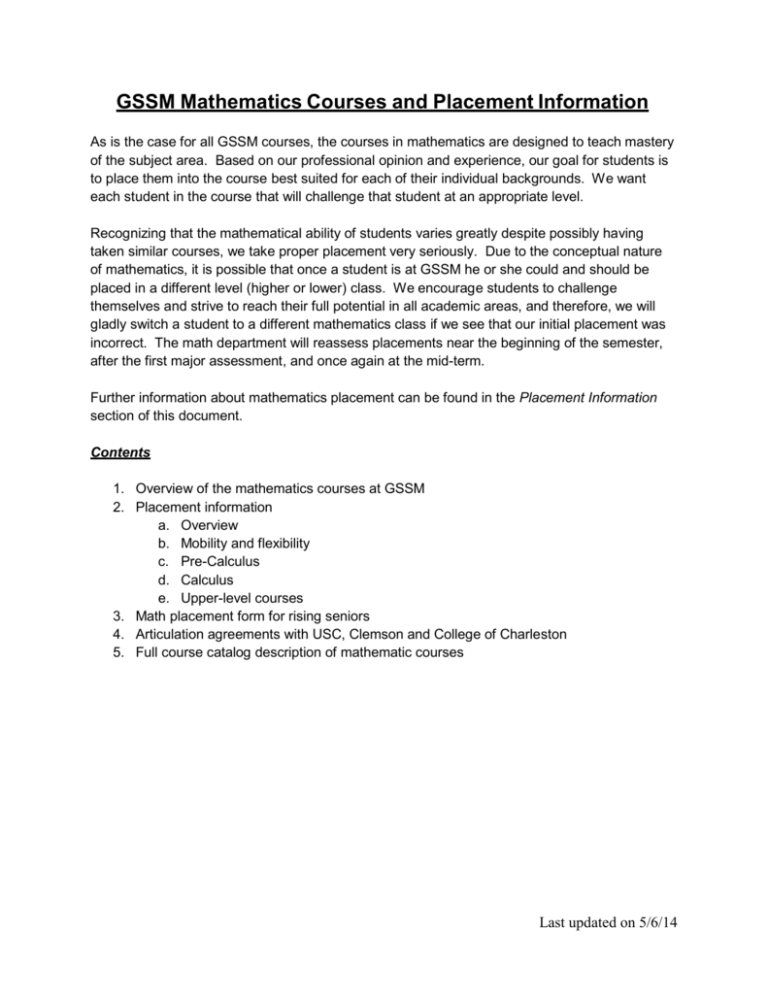
GSSM Mathematics Courses and Placement Information As is the case for all GSSM courses, the courses in mathematics are designed to teach mastery of the subject area. Based on our professional opinion and experience, our goal for students is to place them into the course best suited for each of their individual backgrounds. We want each student in the course that will challenge that student at an appropriate level. Recognizing that the mathematical ability of students varies greatly despite possibly having taken similar courses, we take proper placement very seriously. Due to the conceptual nature of mathematics, it is possible that once a student is at GSSM he or she could and should be placed in a different level (higher or lower) class. We encourage students to challenge themselves and strive to reach their full potential in all academic areas, and therefore, we will gladly switch a student to a different mathematics class if we see that our initial placement was incorrect. The math department will reassess placements near the beginning of the semester, after the first major assessment, and once again at the mid-term. Further information about mathematics placement can be found in the Placement Information section of this document. Contents 1. Overview of the mathematics courses at GSSM 2. Placement information a. Overview b. Mobility and flexibility c. Pre-Calculus d. Calculus e. Upper-level courses 3. Math placement form for rising seniors 4. Articulation agreements with USC, Clemson and College of Charleston 5. Full course catalog description of mathematic courses Last updated on 5/6/14 1. Overview of the mathematics courses at GSSM: In order to graduate from GSSM, every student needs to be working toward completing calculus at some level before graduating from GSSM. Every student who has completed calculus before or at GSSM will be able to take more advanced mathematics at GSSM. Pre-Calculus Math 102 - 103 (Advanced Mathematics II and III) is designed to move at a pace that allows the student additional time for extra practice on key problems related to the algebraic foundations of calculus. This is one of the pathways to prepare for calculus. Math 111 – 112 (Anaylsis I and II) is designed to provide both foundational instruction as well as advanced training in problem solving and will enable progress towards learning calculus at a faster pace. Calculus Math 200 (Calculus) is designed to move at a pace that allows additional time to practice fundamental problems in elementary calculus. Math 201-202 (AP Calculus AB) is designed to present more advanced problems and provides greater depth in the theoretical foundations of calculus than the Math 200 course. Math 203 (year-long)/303 (semester) (AP Calculus BC) is designed to present more topics, advanced problems, and greater depth in the underlying theory of calculus than Math 201-202. Electives Math 304-305 Probability and Statistics: AP Statistics Math 301 Linear Algebra Math 306 Multivariate Calculus Math 307 Discrete Structures Math 308 Regression Analysis Math 312 Ordinary Differential Equations Math 300 Strategies for Solving Mathematical Problems Last updated on 5/6/14 2. Placement information and additional course information This section is intended to provide general information regarding the placement process for both juniors and seniors as well as more information about each course. Overview During the registration process, all rising juniors are asked to select the math courses, along with their other courses, that they want to take. During New Student Orientation Day, all rising juniors are given placement assessments, which are used in addition to their placement request, transcripts, PSAT Math scores and previous grades in mathematics, to place them in the proper math courses. The rising seniors are asked to select math courses for their senior year during the spring of their junior year. Actual placements for seniors are determined by their requests and their performance in mathematics during their junior year. The mathematics department’s goal is to place students in courses which are best suited to their level of preparation. Because juniors enter GSSM with various backgrounds in mathematics, a placement assessment is given to help determine their proper mathematical placement. The placement assessment is a diagnostic assessment used to determine a student’s mathematical strengths and weaknesses in mathematical manipulation and will most likely contain some topics not seen by every student in their previous math courses. The placement assessment is not designed like normal assessments where students should expect to get all of the questions correct. Also, the placement assessment is solely used for placement purposes and will not be used in future grade determination once placed in the proper course. Only rising juniors take placement assessments. Two versions of the placement assessment are given depending on the courses which incoming juniors have previously taken. The algebra-based placement assessment is given to those who have not yet taken a course in calculus. Students currently enrolled in pre-calculus will take this assessment. The calculus-based placement assessment is given to those who have successfully completed a course in calculus or who are currently enrolled in a calculus course. Mobility and Flexibility Once placed in a math course, homework problems, quiz scores, and test scores may indicate that a student needs to be moved to a more advanced course or needs to be moved to a course with a slower pace. The student may submit a request to be moved or the student’s teacher may ask for the student to be moved to a different level. In any case, the change must be discussed by the student and the teacher of the current course and the teacher of the course where the student is potentially going to be placed. These changes are ideally made as soon as possible within the semester and may not be made after the midterm. Last updated on 5/6/14 Pre-Calculus Courses Math 102-103 (meets 4 times a week both semesters) is a two-semester sequence designed to prepare a student for the study of calculus with the extra hour of class each week designed to help students by providing more practice applying the concepts. Math 111-112 is a two-semester sequence designed to prepare a student for the study of calculus. The course moves at a more rigorous pace than Math 102-103. Calculus Courses Calculus Courses: Math 200 (year-long) and Math 201-202 (one semester each) and Math 203 (year-long)/Math 303 (spring semester only) The Math 200 (year-long) course is application oriented while the Math 201-202 course introduces students to proofs of the theorems of calculus as well as its applications. The measurable differences in the two courses is Math 200 deals with the application of calculus in such a way that students have a thorough understanding of how to solve basic and moderate problems using standard theorems. The pace and syllabus may vary to allow students more time to master specific topics. This course has an articulation agreement with College of Charleston’s Introductory Calculus (Math 120) course. The Math 201-202 series is classified as an AP Calculus AB course as well as an articulation agreement course with USC (Math 141), Clemson (MTHSC 106), and College of Charleston (Math 120). For this reason the pace and syllabus are strictly followed. The course is more rigorous with respect to the development of the theory of calculus and more demanding with respect to the problems which the students solve. Math 203 (meets 4 times a week, 2 semesters) is classified as an AP Calculus BC course as well as an articulation agreement course with USC (Math 141-142), Clemson (MTHSC 106108), and College of Charleston (Math 220). For this reason the pace and syllabus are strictly followed. The course includes more topics and is more rigorous with respect to the development of the theory of calculus and more demanding with respect to the problems which the students solve. Math 303 (meets 4 times a week, spring semester only) is the spring semester of the Math 203 course. This course is classified as an articulation agreement course with both USC (Math 142) and Clemson (MTHSC 108). Essentially this course is designed for those who have taken the AP Calculus AB course and would also like to learn the material necessary for the AP Calculus BC exam. Last updated on 5/6/14 Upper Level Mathematics Courses Math 304-305: Probability and Statistics (AP Stat) This series is classified as an AP Statistics course as well as an articulation agreement course with USC (STAT 201), Clemson (MTHSC 203), and College of Charleston (Math 250). For these reasons, the pace and syllabus are strictly followed. The course is rigorous with respect to the development of statistical theory and demanding with respect to the problems which the students solve. Students may opt to take only the fall semester of the course; however, these students would not be expected to take the AP Statistics exam. Co-requisite: Must have completed calculus or be taking calculus to enroll. MAT301-H Linear Algebra (Fall of 2014; offered in even numbered years – 0.5 unit) Prerequisite is MAT202-AP or permission of instructor. MAT306-H Multivariate Calculus (Fall semester 2015; offered in odd numbered years– 0.5 unit) Pre-requisite is MAT202-AP or permission of instructor. MAT307-H Discrete Structures (Spring semester 2016; offered in even numbered years– 0.5 unit) Pre-requisite or Co-requisite is MAT202-AP or permission of instructor. This course has an articulation agreement with College of Charleston (Math207). MAT308-H Regression Analysis (Fall semester) Pre-requisite is MAT202-AP or permission of instructor. MAT312-H Ordinary Differential Equations (Spring 2015; offered in odd numbered years – 0.5 unit) Pre-requisite is MAT301 or permission of instructor. MAT300-H Strategies for Solving Mathematical Problems (FALL/SPRING – 0.5 unit) 0.5 unit credit for the entire year. ***This course does not count toward any graduation requirement; it is an elective overload. PREREQ: Permission of the instructor. Note that students who are interested in math competitions are the group who take this course. Last updated on 5/6/14 3. 2013-2014 Math Placement form for rising Seniors Student should complete items 1, 2, and 3 and then take the form to his or her current math instructor for placement recommendation. 1. Student: 2. Current math course: a. Fall semester grade: b. Spring mid-term grade: 3. Math course(s) requested by student for 2013-2014: The Math Department uses the following general guidelines when recommending math placements for rising Seniors: For students currently enrolled in MAT 102/103, a grade of 90 is needed for MAT 201 (Calculus AB) and 95 for MAT 203 (Calculus BC). For students currently enrolled in MAT 111/112, a grade of 85 is needed for MAT 201 (Calculus AB) and 93 for MAT 203 (Calculus BC). For students currently enrolled in MAT 202 or MAT 203, you may choose between MAT 304 (Statistics) or MAT 308 (Regression Analysis) or MAT 306 (Multivariate Calculus) for the Fall. For the Spring semester, the choices are MAT 303 (Calculus BC), MAT 307 (Discrete Structures) or MAT 305 (Statistics, only upon successful completion of MAT 304). Current math instructor should complete item 4 and 5 (if needed) with the student. 4. Current math instructor’s recommendation(s) for 2013-2014 math course(s): 5. If the student request and the instructor recommendation differ, please explain the reason below (please use the back if needed). If there is a plan of action to reconsider the instructor’s recommendation at the end of the semester, please include the plan. Student Signature: Date: Instructor Signature: Date: Last updated on 5/6/14 4. Articulation Agreements GSSM has memorandums of understanding with Clemson University, the University of South Carolina-Columbia and College of Charleston to grant college credit for certain GSSM courses that are closely aligned with the university's courses. Students must earn at least a B in the GSSM course to receive college credit. Some courses in the initiative are in the Advanced Placement (AP) program while others are beyond this level. Students may continue to take the AP exams where applicable. The following tables specify the course equivalencies and credits granted by each university. Note that the tables are not the same for each university because the credit is based on matching GSSM courses with equivalent courses at the respective universities. Students must earn a grade of A or B in the GSSM course to receive college credit. Course Credit for GSSM Graduates who Attend Clemson Clemson Course Mathematics Calculus of One Variable I (MTHSC 106) Calculus of One Variable I and II (MTHSC 106 and 108) Calculus of One Variable II (MTHSC 108) Elementary Statistical Inference (MTHSC 203) Credits GSSM Course 4 MAT201 and MAT202 8 MAT203 4 MAT303 3 MAT304 and MAT305 Course Credit for GSSM Graduates who Attend USC USC Course Mathematics Calculus I (MATH 141) Calculus I and II (MATH 141 and 142) Calculus II (MATH 142) Statistics Elementary Statistics (STAT 201) Credits GSSM Course 4 MAT201 and MAT202 8 MAT203 4 MAT303 MAT304 and MAT305 Last updated on 5/6/14 Course Credit for GSSM Graduates who Attend College of Charleston College of Charleston Course Credits GSSM Course 4 MAT 200 4 MAT 201 & MAT 202 4 MAT 203 3 MAT 304 & MAT 305 3 MAT 307 Mathematics Introductory Calculus (MATH 120) Introductory Calculus (MATH 120) Calculus II (MATH 220) Statistical Methods I (MATH 250) Discrete Structures I (MATH 207) Last updated on 5/6/14 5. Excerpt from the GSSM Course Catalog MATHEMATICS- ALL STUDENTS MUST TAKE ONE MATH CLASS EVERY SEMESTER MAT102-H Advanced Mathematics II - Algebraic Functions and Graphs (FALL Semester – 0.5 unit) The first of a two-semester sequence designed to prepare a student for the study of calculus. The following types of functions and their graphs are covered in detail: linear, polynomial, exponential and logarithmic. MAT103-H Advanced Mathematics III - Trigonometry and Discrete Math (SPRING Semester – 0.5 unit) The second of a two-semester sequence designed to prepare a student for the study of calculus. Topics include trigonometry, matrices, vectors and polar graphs. PREREQ: MAT102-H. MAT111-H Analysis I – Algebraic Functions and Graphs (FALL Semester – 0.5 unit) The first of a two-semester sequence designed to prepare a student for Advanced Placement Calculus. Topics include linear functions, polynomial functions, rational functions, exponential functions, and logarithmic functions. MAT112-H Analysis II – Applications of Functions (SPRING Semester – 0.5 unit) The second of a two-semester sequence. Topics include transformations, function composition, trigonometry, vectors & matrices, sequences & series, parametric & polar functions and conic sections. PREREQ: MAT111-H. MAT200-H Calculus with Applications (A Full Year Course – 1.0 unit) This course in differential and integral calculus is application-oriented. Mastery of fundamental calculus operations and problem-solving techniques are high priorities. Pedagogically, the approach is intuitive with the results informally stated. Students are required to utilize skills in differentiation and integration of various functions and to solve applied problems. PREREQ: MAT103-H or MAT112-H. See Articulation Agreements at end of course descriptions. MAT201-AP (AP Calc AB) Calculus I (AP Calc AB) (FALL Semester – 0.5 unit) In Calculus I, the student will be introduced to such topics as limits and continuity, derivatives, max-min theory, optimization and related rates applications, the Mean Value Theorem and Rolle’s Theorem, and the indefinite integral. PREREQ: MAT103-H, MAT112-H or Permission of Instructor. See Articulation Agreements at end of course descriptions. MAT202-AP (AP Calc AB) Calculus II (AP Calc AB) (SPRING Semester – 0.5 unit) Students will be introduced to Riemann sums, the definite integral, the Fundamental Theorems of Calculus, techniques of integration, numerical methods, and differential equations involving growth and decay and l’Hôpital’s Rule. Integral calculus will also focus on the study of area, volume, arc length, and associated applications. The MAT201-AP/202-AP sequence prepares students for the AP Calculus AB exam. PREREQ: MAT201-AP. See Articulation Agreements at end of course descriptions. MAT203-AP (AP Calc BC) Calculus I and II (AP Calc BC) (A Full Year Course – 1.0 unit) The content of this course parallels MAT201-AP, MAT-202-AP, and MAT303-AP, but at a considerably faster pace. The course meets four periods each week to allow an in-depth treatment of the topics. Students should have a strong interest in mathematics and demonstrated proficiency in previous mathematics classes. This course prepares students for the AP Calculus BC exam. PREREQ: MAT112-H or completion of Pre-Calc. and a high score on the initial placement test and Permission of the Instructor. See Articulation Agreements at end of course descriptions. Last updated on 5/6/14 MAT300-H Strategies for Solving Mathematical Problems I (A Full Year Course – *0.5 unit) Topics include methods of solving advanced problems in algebra, geometry, number theory, calculus, data analysis, and probability. The strategies and concepts learned will be helpful to students participating in mathematics competitions. This course must be taken with another mathematics course. The course meets for one hour and twenty minutes each week for both semesters and carries *0.5 unit credit for the entire year. This course does not count toward any graduation requirement; it is an elective overload. PREREQ: Permission of the instructor MAT301-H Linear Algebra (FALL 2014 offered even numbered years – 0.5 unit) This course includes solving systems by matrix methods, matrix operations, matrix algebra, determinants, Cramer’s rule, vector algebra, the dot and cross products used in projections and geometric applications, lines and planes in 3-space, vector spaces, linear independence, linear transformations, eigenvalues, and eigenvectors. PREREQ: MAT202-AP, MAT203/303-AP or completion of AP Calculus. MAT303-AP (AP Calc BC) Calculus III (AP Calc BC) (SPRING Semester – 0.5 unit) This course covers areas of regions bounded by polar graphs, the calculus of parametric equations, integration using partial fractions and trigonometric substitution and associated applications. Other topics of interest include series and sequences, tests of convergence, absolute and conditional convergence, power series, and the Taylor and Maclaurin series. Graphing calculators are used when appropriate. This course meets four hours each week, prepares students for the AP Calculus BC exam, and may meet with a MAT203-AP class. PREREQ: MAT202-AP or completion of AP Calculus AB. See Articulation Agreements at end of course descriptions. MAT304-AP (AP Stat) Probability and Statistics (AP Stat) (FALL Semester – 0.5 unit) An introductory course in probability and statistics. Topics include exploratory data analysis, regression & correlation, design, probability and sampling distributions. This is the first of a twosemester sequence that prepares a student for the Advanced Placement Statistics exam. COREQ: Must have completed calculus or be taking calculus to enroll. See Articulation Agreements at end of course descriptions. MAT305-AP (AP Stat) Applied Statistics (AP Stat) (SPRING Semester – 0.5 unit) This course is the second of a two-semester sequence that prepares students for the Advanced Placement Statistics exam. This course focuses on statistical inference. Topics include inference on means and proportions, inference on regression and one-way ANOVA. PREREQ: MAT 304-AP. See Articulation Agreements at end of course descriptions. MAT306-H Multivariate Calculus (FALL 2015; offered odd numbered years– 0.5 unit) This course examines the calculus of real functions of two or more variables. Differential calculus topics include continuity, directional derivatives, tangent planes, and max-min theory. Integral calculus topics will include double integrals in the Cartesian and polar coordinate systems, surface area, and triple integrals in the Cartesian, cylindrical, and spherical coordinate systems. We shall also consider topics in curvilinear motion including velocity, acceleration, and curvature. PREREQ: MAT202-AP or completion of AP Calculus AB. MAT307-H Discrete Structures (SPRING 2016; offered even numbered years – 0.5 unit) This course is a survey of logic and set theory. Topics include propositional and predicate logic, the algebra of sets including mappings, relations and functions, counting principles and probability, and the introduction of the concept of the mathematical proof including induction. PREREQ: Completion of AP Calculus or COREQ: MAT202-AP. See Articulation Agreements at end of course descriptions. MAT308-H Regression Analysis (FALL Semester – 0.5 unit) This advanced course in statistics will provide an overview of regression analysis and its applications. Linear regression and multiple regression models will be studied. First-order and second-order models with multiple independent variables will be examined for estimation and prediction. PREREQ: Completion of AP Calculus or MAT202-AP. Last updated on 5/6/14 MAT312-H Ordinary Differential Equations (SPRING 2015; offered odd numbered years – 0.5 unit) This course includes the study of first order differential equations beginning with separable equations and their applications, exact equations with integrating factors and homogeneous equations. Also investigated are second order linear equations, which include homogeneous equations with constant coefficients and non-homogeneous equations using the method of undetermined coefficients and the method of variation of parameters. PREREQ: Math 301--H or Permission of the Instructor. Last updated on 5/6/14

